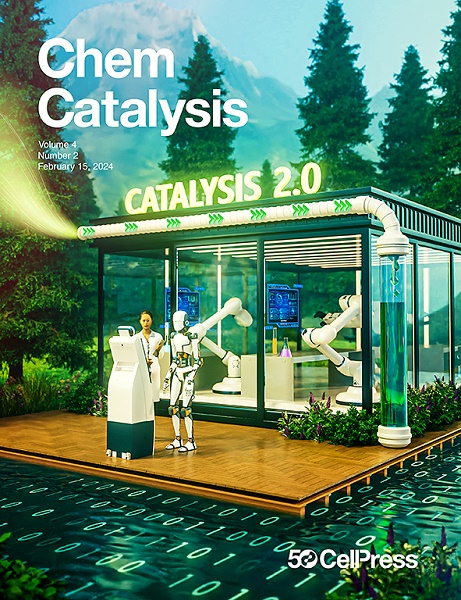Engineering PHL7 for improved poly(ethylene terephthalate) depolymerization via rational design and directed evolution
IF 11.6
Q1 CHEMISTRY, PHYSICAL
引用次数: 0
Abstract
Enzymatic depolymerization of poly(ethylene terephthalate) (PET) has emerged as a promising approach for polyester recycling, and, to date, many natural and engineered PET hydrolase enzymes have been reported. For industrial use, PET hydrolases must achieve high depolymerization extent and exhibit excellent thermostability. Here, we engineered a natural PET hydrolase, Polyester Hydrolase Leipzig #7 (PHL7), through rational design and directed evolution using a high-throughput screening platform. Four new enzymes were engineered with enhanced properties compared with the parent enzyme, wild-type PHL7 (PHL7-WT), and other benchmark PET hydrolases, under the tested conditions. In bioreactors, the exemplary engineered enzyme, PHL7-Jemez, exhibited improved ability to depolymerize amorphous PET film compared with PHL7-WT at 2.9% and 20% substrate loadings, with 37% and 270% higher hydrolysis, respectively, after 48 h. This study develops several state-of-the-art PET hydrolases and demonstrates a directed evolution platform to engineer high-performance enzymes, which can accelerate enzyme discovery toward improved biocatalytic recycling.

工程PHL7通过合理设计和定向进化改进聚对苯二甲酸乙酯解聚
酶解聚聚对苯二甲酸乙酯(PET)已成为聚酯回收利用的一种很有前途的方法,迄今为止,许多天然和工程的PET水解酶已被报道。对于工业用途,PET水解酶必须达到高解聚程度并具有优异的热稳定性。在这里,我们设计了一种天然的PET水解酶,聚酯水解酶Leipzig #7 (PHL7),通过合理的设计和高通量筛选平台的定向进化。在测试条件下,与亲本酶、野生型PHL7 (PHL7- wt)和其他基准PET水解酶相比,四种新酶的性能得到了增强。在生物反应器中,与PHL7-WT相比,典型工程酶PHL7-Jemez在2.9%和20%底物负荷下表现出更高的非晶态PET膜解聚能力,48小时后水解率分别提高37%和270%。本研究开发了几种最先进的PET水解酶,并展示了一个定向进化平台来设计高性能酶,这可以加速酶的发现,从而改善生物催化循环。
本文章由计算机程序翻译,如有差异,请以英文原文为准。
求助全文
约1分钟内获得全文
求助全文
来源期刊
CiteScore
10.50
自引率
6.40%
发文量
0
期刊介绍:
Chem Catalysis is a monthly journal that publishes innovative research on fundamental and applied catalysis, providing a platform for researchers across chemistry, chemical engineering, and related fields. It serves as a premier resource for scientists and engineers in academia and industry, covering heterogeneous, homogeneous, and biocatalysis. Emphasizing transformative methods and technologies, the journal aims to advance understanding, introduce novel catalysts, and connect fundamental insights to real-world applications for societal benefit.

 求助内容:
求助内容: 应助结果提醒方式:
应助结果提醒方式:


